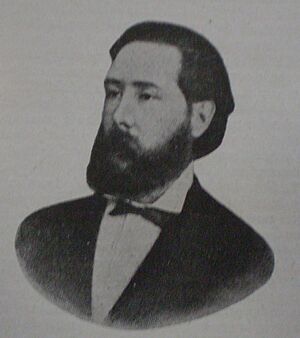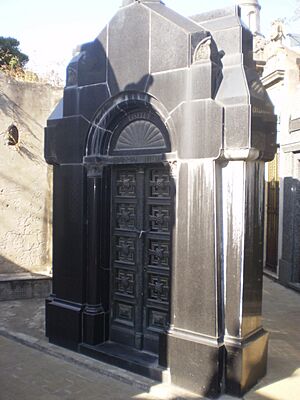Eduardo Wilde facts for kids
Eduardo Wilde (born June 15, 1844 – died September 5, 1913) was an important Argentine doctor, politician, and writer. He was one of the most famous thinkers of his time, part of a group called the "Generation of '80" who worked to modernize Argentina.
Contents
Early Life and Medical Career
Eduardo Faustino Wilde was born in Tupiza, Bolivia, in 1844. His mother was from Tucumán, Argentina, and his father was an English Argentine from Buenos Aires. His father, Colonel Diego Wilde, had temporarily left Argentina because of Governor Juan Manuel de Rosas. He returned after Rosas's rule ended in 1852.
Eduardo grew up in Concepción del Uruguay. He went to the local Colegio Nacional, which was a public school that prepared students for college. Future presidents Julio Roca and Victorino de la Plaza were his classmates there.
In 1864, Wilde started studying medicine at the University of Buenos Aires. As a student, he helped people who were sick with cholera during an outbreak in 1867. His own father died from cholera in 1866 while serving in the Paraguayan War.
After working at the General Women's Hospital, he became a doctor in 1870. He wrote his final paper on hiccups. However, his work as an Army doctor in the Paraguayan War and during the big yellow fever outbreak in Buenos Aires in 1871 made him well-known. Because of this, he became a professor at the university in 1873. He began working for the government when President Domingo Sarmiento made him the nation's Director of Public Health.
Political Life and Important Changes
Wilde supported Adolfo Alsina's political group, the Autonomist Party. In 1874, he was elected to the provincial legislature in Buenos Aires. He became the vice president of that group before being elected to the Lower House of Congress in 1876.
During his two terms in Congress, he became a leading liberal voice. He often disagreed with the powerful conservative politician Aristóbulo del Valle. Wilde was interested in many things. He also wrote for several newspapers and was the director of La República for four years.
In 1882, his former classmate, President Julio Roca, appointed him Minister of Justice and Education. Wilde made sure a lot of money was spent on the Colegio Nacional schools and on schools that trained teachers. He also created important laws:
- Law 1420: This was the first law that made secular education (education without religious teaching) required for everyone.
- Laws 1565 and 2393: These laws made civil marriages (marriages recognized by the government, not just the church) mandatory. These changes reduced the Catholic Church's control over education and marriage.
Modernizing Argentina
These reforms helped him get nominated for the powerful Internal Affairs Minister's job in 1886. This was under Miguel Juárez Celman, who was chosen by President Roca. Wilde focused on public health for the country's fast-growing population. He also asked Eduardo Madero, a financier, to build a new port. This port later became known as Puerto Madero.
These projects, along with his earlier work, helped modernize Argentina socially and economically. This was a main goal of the "Generation of 1880," the group of people who shared these ideas. In 1888, a famous uncle of his, Dr. José Antonio Wilde, passed away. Eduardo Wilde then approved renaming the settlement (which is now a suburb of Buenos Aires) in his uncle's honor.
Travels and Later Career
In 1890, there was a big financial crisis called the Panic of 1890. This led to a political uprising called the Revolution of the Park. President Juárez Celman and his cabinet, including Wilde, resigned.
For the next eight years, Wilde traveled around the world. He visited the United States, Japan, China, Egypt, and many countries in Europe. He wrote about his travels in detailed diaries, which were published as Travels and Observations and By Land and by Sea.
He also spent time writing about his medical knowledge. He published Lessons in Hygiene and Lessons in Legal Medicine and Toxicology. He also wrote Prometheus and Company, which shared his experiences as a doctor.
Wilde returned to public service when Roca was re-elected president in 1898. He was again named Director of Public Health. When an outbreak of the bubonic plague happened in Asunción, Paraguay, Wilde quickly organized a humanitarian mission. He appointed Dr. Carlos Malbrán, Argentina's top epidemiologist at the time, to lead it.
Diplomatic Roles
In 1900, President Roca appointed Wilde as Ambassador to the United States. He continued to share his knowledge at international meetings. This included the 1901 International Conference of Sanitation in Havana and the 1902 International Conference on Blindness.
After that, he served as ambassador in Mexico, Spain, the Netherlands, and Belgium. In 1913, he represented Argentina at the Brussels Conference on the Polar regions. He died in Brussels shortly after the conference. Eduardo Wilde was buried in La Recoleta Cemetery in Buenos Aires.
See also
 In Spanish: Eduardo Wilde para niños
In Spanish: Eduardo Wilde para niños



